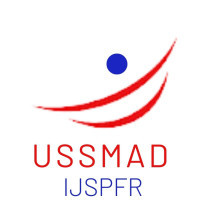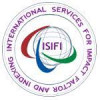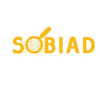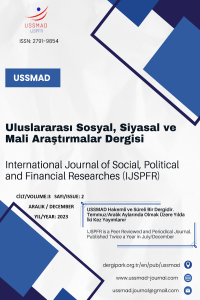Research Article
Issue Editorial Board


Gamze Yıldız Şeren, PhD, is an Associate Professor in the Department of Public Finance at Tekirdağ Namık Kemal University. She obtained her bachelor's, master's, and doctoral degrees in Public Finance from Marmara University. Her scholarly work focuses on public finance theory, public finance economics, public budgeting, and gender-informed approaches to fiscal policy. Throughout her academic career, she has presented her research at numerous national and international congresses, seminars, and workshops. She has also undertaken extensive editorial responsibilities, serving as editor for a considerable number of national and international academic books.
Aim & Scope
International Journal of Social, Political and Financial Researches; It aims to contribute original studies in the field of social sciences to the literature.
It is a scientific, international peer-reviewed and open-access electronic journal that publishes original Turkish and English scientific articles on various subjects covering social, political and financial fields. At IJSPFR, all articles covering social, political and financial fields are taken into the evaluation process. IJSPFR has a wide range of topics.
Author Guidelines
International Journal of Social Political and Financial Researches Authorship Rules and Publication Policy
1. APA 7 should be used as the citation style in studies submitted to the International Journal of Social Political and Financial Research. See ANNEX-1 for APA 7 “Citation Guide”.
2. Studies sent to the International Journal of Social Political and Financial Research; It should cover areas such as finance, economics, business administration, political science and public administration, international relations, international trade, labor economics and industrial relations, finance and banking, health management, management and information systems, econometrics and financial econometrics.
3. Studies conducted in accordance with scientific research, publication ethics and writing rules must not have been published anywhere before. All responsibility in this regard belongs entirely to the author(s).
4. The journal does not request any fee from the authors, nor does it pay any royalty fees to the authors.
5. Only one article by an author is published in the same year (excluding special issues). Even if the author's second article sent to the journal in the same year is accepted, it will be queued for the issue to be published the following year.
6. Studies written in either Turkish or English are accepted for the journal.
7. Blind refereeing is essential in accordance with the quality and ethical principles of scientific studies to be published in the journal. The study, which is approved by the editor, is sent to at least two referees for evaluation. For the study to be accepted, both referees who evaluate the study must express a positive opinion. If one of the referees expresses a negative opinion, the study is sent to a third referee. If the third referee expresses a positive opinion, the study is accepted. Otherwise, the work will be rejected. Referees' correction requests must be fully met by the authors and delivered to the editor. However, due to the nature of science, authors may object to referees' correction requests. In this case, the authors have to show counter-evidence.
7. The copyright and publishing rights of the published works belong to the journal. For this reason, when submitting studies to the journal, a copyright transfer form is also requested from the authors. The Copyright Transfer Form must be signed by all authors. See ANNEX-2 for the “Copyright Transfer Form”.
8. Articles to be sent to the journal should not exceed 25 pages, including abstract, bibliography, references and tables.
9. For articles submitted to the journal, authors are requested to send a similarity report using a plagiarism scanning program (iThenticate, Turnitin). Articles of authors who do not submit this report will not be published. The upper limit for similarity reports is set at 20%, excluding bibliography (This condition is not required for publications derived from postgraduate theses, and at this point, the authority is exercised by the journal editor). Articles that are more similar than this ratio are rejected by the editorship, even if the process is completed.
10. In publications presented at scientific meetings, published in abstracts, or derived from postgraduate theses, the author must indicate this on the article cover page. The responsibility for any shortcomings in this regard lies with the author(s) and the journal cannot be held responsible.
11. Studies submitted to the journal must be prepared in accordance with the template in Microsoft Word (doc.) format. For “Template” see ANNEX-3. The journal's writing template includes all general text formatting, page margins, paragraph formatting, table and figure formatting, and heading formats. Since no fee is requested from the authors for the works sent to the journal, the authors must prepare and submit their works in accordance with the writing guide and template. Studies that are not prepared in accordance with the template will not be sent to the referees and will be rejected by the editor.
12. As stated in the journal template, Turkish and English abstracts should be between 100-200 words. There should be 3-5 keywords and 2-4 JEL codes at the end of the abstracts.
13. If the studies submitted to the journal are supported by an institution, this information should be stated by the author in the footnote on the first page.
14. For studies that do not require ethics committee permission, the form in ANNEX-4 must be filled out and uploaded to the system. For studies that require ethics committee permission, the Ethics Committee Permission Document must be uploaded to the system by the authors.
Annex 1
Annex-2
Annex-3
Annex-4
Ethical Principles and Publication Policy
Editors' Responsibilities
The editor and field editors of the International Journal of Social, Political and Financial Research, in accordance with the “COPE Code of Conduct and Best Practice Guidelines for Journal Editors” and “COPE Best Practice Guidelines for Journal Editors” published as open access by the Committee on Publication Ethics (COPE). Must have the ethical duties and responsibilities listed below:
• To decide whether the articles submitted for publication comply with the journal's purpose and publication policies.
• To check that there is nothing degrading, insulting or in violation of copyright in the articles sent, and to make the necessary decision within the framework of legal legislation when necessary.
• To ensure the continuous development of the magazine and to ensure that its content and quality continue to increase.
• To ensure that any information about the articles sent to the journal is not disclosed by the editor to anyone other than the editorial board, referees and the journal owner.
• Not to allow anyone to use unpublished materials and other information and data in the texts submitted to the journal by the author(s) in their own work without the express and written permission of the author(s).
Responsibilities of referees
• If referees do not find the work assigned to them relevant to their field, feel inadequate in evaluating the article, or do not have the required time for evaluation, they should withdraw from the task.
• Referees should never give information about the article they receive to anyone other than the journal editor. The article should not be discussed in other environments and confidentiality should be maintained from the beginning to the end of the process.
• Referees must make their criticisms objectively, fairly and in accordance with scientific ethics. Referees should not direct any personal criticism towards the author of the article, should not make comments focused on the authors' ethnicity, gender or political philosophy, and should ensure that the blind referee process continues fairly to evaluate the texts.
• Referees must review the entire text in accordance with the publication rules, and if the study is similar to another previously published study beyond legal standards, they must notify the editor.
• Care should be taken to ensure that referees have no connection with the author. If a possible conflict of interest arises, arbitrators must withdraw from the arbitration process.
• Referees should contribute to the editors to make the texts submitted to the journal more qualified.
Responsibilities of Authors
All works submitted to USSMAD must be original. Author(s) must undertake that the text they submit has not been previously published in any journal or publication.
• The text must be written within scientific criteria and contain sufficient resources.
• Author(s) are obliged to carefully examine the journal publication rules and prepare their articles in accordance with these rules.
• The author(s) must make all corrections suggested by the editor or referee in a timely and meticulous manner.
• Author(s) must upload all information and documents requested by the journal editor to the system within the time given to them.
• If the requirements requested by the editor or referee are not fulfilled during the process, the article is deemed to be withdrawn by the author(s).
• In case of a possible problem or need, the author(s) must preserve the raw data that forms the basis of their articles until the appropriate time following the publication of the article.
CODE OF ETHICS
1. In the uploaded study sent by the author(s) to the International Journal of Social, Political and Financial Research, all ethical rules were complied with, and all sources used were cited in accordance with the spelling rules.
2. All individuals and institutions that contributed to the study are included in the study.
3. This is an original study, it has not been published anywhere before, it has not been sent for publication, it is not a study accepted for publication and put on hold, it will not be sent to another journal while the International Journal of Social, Political and Financial Research is in the publication process.
4. If the study is produced from a thesis or derived from a paper, this is stated as a footnote on the first page of the article.
5. All authors of the article have reviewed the final version of the article and allowed it to be uploaded to the journal.
6. There was no ethical violation against all subjects and subjects whose data were used in the study, no illegal methods were used during the research, all legal permissions were obtained for the study and ethical rules were followed. There is no criminal element or illegal expression in the work.
7. All information and documents regarding the evaluation process of the study have not been and will not be shared with third parties.
8. The publishing rights, financial rights, processing, reproduction, representation, printing, publication, distribution and all communication rights to the public, including transmission via the internet, of all articles sent to the journal and accepted for publication belong to the International Journal of Social, Political and Financial Researches.
Price Policy
International Journal of Social, Political and Financial Researches (IJSPFR) is open access; No fee is charged for the article evaluation process, access to articles or publication processes.
Indexes
Other Indexes
Journal Boards
Owner - Editor-in-Chief

Editors





 Web
Web
Publishing Editor





 Web
Web
Public Finance Field Editor


Economics Field Editor


Political Science and Public Administration Field Editor

Social Work Field Editor

Doç. Dr. Dicle Üniversitesi İktisadi ve idari Bilimler Fakültesi Sosyal Hizmet Bölümü
Business Field Editor




Econometrics Field Editor

N.TUBA YILMAZ received her B.Sc. degree from Marmara University, Department of Econometrics in 2006, and her M.Sc. and Ph.D. degrees from Marmara University, Department of Econometrics, Division of Operations Research in 2009 and 2015, respectively. During her master's degree, she worked as a researcher at SRH Hochschule Berlin University in Germany for one year. Between 2007 and 2016, she worked as a Research Assistant in the Department of Econometrics and between 2016 and 2024, she worked as an Assistant Professor in the same department. In 2024, she received the title of Associate Professor in Quantitative Decision Methods. Her research interests include game theory, simulation and stochastic processes.
Law Field Editor

Pamukkale Üniversitesi Hukuk Fakültesi Medenî Usûl ve İcra İflâs Hukuku Anabilim Dalı
Statistics Field Editor





 Web
Web
Tourism Field Editor

Batman'da doğdu (1985). Anadolu Üniversitesi Turizm İşletmeciliği Bölümü'nde yüksek lisans (2013) ve doktora (2017) öğrenimini tamamladı. 2021 yılında Turizm Bilimleri Alanında Doçent unvanını almaya hak kazandı. Arıca, şu anda Batman Üniversitesi Turizm Fakültesi'nde doçent olarak görev yapmaktadır. Batman Üniversitesi Turizm Fakültesi'nde dekan yardımcısı ve Gastronomi ve Mutfak Sanatları bölüm başkanıdır. Araştırmacının temel araştırma alanları sürdürülebilir turizm, turizm pazarlaması, teknoloji birlikte ortak üretimi ve sosyal medyadır. Araştırmacının, AB ve Kalkınma Ajansı projelerinde uzman rolü, TÜBİTAK'ta proje danışmanlığı ve hakemlik görevleri bulunmaktadır. Ayrıca araştırmacı, uluslararası dergilerde eş editör ve editör kurulu üyesi olarak ve Alanya Turizm Uygulama ve Araştırma Merkezi'nde araştırmacı olarak çalışmaktadır.
Communication Sciences Field Editor





 Web
Web
2005’te Afyon Kocatepe Üniversitesi Sosyal Bilgiler Öğretmenliği, 2010’da ise Ege Üniversitesi İletişim Fakültesi Radyo Televizyon ve Sinema Bölümü lisans öğrenimini birincilikle tamamladı. Ege Üniversitesi Sosyal Bilimler Enstitüsü, Radyo Televizyon ve Sinema Anabilim Dalı’nda yüksek lisans, İstanbul Üniversitesi, Sosyal Bilimler Enstitüsü, Radyo Televizyon ve Sinema Anabilim Dalı’nda doktora derecesini aldı. 2020 yılında İletişim Çalışmaları alanında doçent unvanını aldı. Belgesel sinema, yeni iletişim teknolojileri, iletişim kuramları, sosyal medya ve iletişim sosyolojisi alanında çalışmalar yapan Akmeşe’nin iletişim alanında ortak yazarlı birçok çalışması, uluslararası kongre ve sempozyumlarda sunduğu bildirileri, ayrıca danışmanlık yaptığı sinema projeleri ve yönetmen olarak yer aldığı pek çok film çalışması bulunmaktadır. Bugüne dek sekiz kısa filme ve beş belgesele imza attı. Belgesel çalışmaları birçok ulusal ve uluslararası festivalde gösterildi. 2013 yılından buyana Dicle Üniversitesi İletişim Fakültesi Radyo Televizyon ve Sinema Bölümü’nde akademik çalışmalarını sürdüren Akmeşe, akademik çalışmaların yanı sıra Radyo Televizyon ve Sinema Bölüm Başkanlığı görevini de yürütmektedir.
Editorial Assistant


Layout Editor
English Language Editor
Secretariat

Editorial Board



Doç. Dr. Dicle Üniversitesi İktisadi ve idari Bilimler Fakültesi Sosyal Hizmet Bölümü






 Web
Web
Science Board
M. Mustafa Erdoğdu is a Professor in the Faculty of Business and Administrative Sciences at Beykoz University. He holds a PhD in Development Economics and an MA in Development Studies from Manchester University and an MA in Public Finance from Marmara University. He is co-chair of the International Conference of Political Economy, Associate Editor of International Journal of Applied Behavioral Economics; Editorial Board Member of Turkish Studies Journal; International Advisory Board member of International Journal of Sustainable Economies Management and some other journals. He has written extensively on economic development and public finance. He is the author of one book, editor of thirteen books, and author of over fifty journal articles and chapters. Erdogdu’s major research areas are economic development, sustainable development, renewable energies, behavioural public finance, financial crises, and immigration

Prof. Dr. Serkan Benk, 1974 yılında Adıyaman'da doğdu. İlk ve orta öğrenimini Malatya’da tamamladı. Lisans eğitimini 1995-1999 yılları arasında Karadeniz Teknik Üniversitesi İktisadi ve İdari Bilimler Fakültesi Maliye Bölümünde tamamladı. Akademik hayatına 2000 yılında Karadeniz Teknik Üniversitesi’nde Araştırma Görevlisi olarak başladı. “Globalleşmenin Vergi Sistemleri Üzerindeki Etkileri” başlıklı teziyle 31 Aralık 2002 tarihinde Karadeniz Teknik Üniversitesi Sosyal Bilimler Enstitüsü Maliye Anabilim Dalından yüksek lisans derecesini, “Kentiçi Ulaşım Sonucu Oluşan Negatif Dışsallıklar ve Önleme Yolları” başlıklı teziyle de 3 Temmuz 2007 tarihinde Bursa Uludağ Üniversitesi Sosyal Bilimler Enstitüsü Maliye Anabilim Dalından doktora derecesini aldı. Ayrıca Prof. Benk’in, doktora tezi İktisadi Araştırmalar Vakfınca düzenlenen “2007 Yılı Ünal AYSAL Ödüllü Tez Yarışması’nda” doktora tezleri kategorisinde ödüle layık görülmüştür. Serkan Benk 2013 yılında Doçent, 2018 yılında ise profesör unvanını almıştır. Önemli bir kısmı Web of Science kapsamında yer alan indekslerde taranan dergilerde olmak üzere uluslararası ve ulusal hakemli dergilerde yayınlanmış makaleleri, dünyanın önde gelen uluslararası yayınevleri tarafından basılmış kitaplarda editörlükleri, kitap bölümleri, ulusal ve uluslararası toplantılarda sunulmuş bildirileri olup, çalışmaları çok sayıda atıf almıştır. Prof. Dr. Serkan Benk 2012 yılından itibaren İnönü Üniversitesi İktisadi ve İdari Bilimler Fakültesi Maliye Bölümü’nde görev yapmaktadır.

IU International University of Applied Sciences, Erfurt, Germany





Kgothatso Shai is a Professor in the Department of Cultural & Political Studies at the University of Limpopo in South Africa. He is a National Research Foundation (NRF) rated researcher. He is the current President of the South African Association of Public Administration and Management (SAAPAM). Shai also serves as a member of the National Council of the South African Association of Political Studies (SAAPS), where he also presents as an immediate past President. Equally important, Shai is an Executive Committee member of the International Political Science Association (IPSA). He was educated at the Universities of Venda and Limpopo, South Africa. Shai is also the recipient of several academic and non-academic awards at the national and international level.
A Political Scientist by training with passion for supervising African-centered Masters and Doctoral students, Shai is also an esteemed political analyst who has presented several papers in national and international conferences in Africa and beyond. His areas of research and teaching interest straddles the subject of African politics and international relations. He has published widely in many (100+) peer reviewed national and international publications. Among other academic milestones, Shai an editor of the SAAPAM Book Series.


João Félix Pinto Nogueira, PhD in Tax Law, is Professor at the Portuguese Catholic University ("Universidade Católica Portuguesa"). He is Deputy Academic Chairman at IBFD and team manager of IBFD Academic. He is honorary associate professor at the University of Cape Town, South Africa and regular visiting lecturer at several universities. He is Deputy Editor-in-Chief of the World Tax Journal, of the Global Tax Treaty Commentaries, of the Doctoral Series and of the International Tax Studies. He is a member of the list of independent persons of standing of the European Commission and, as such, authorised to serve as arbitrator for the purposes of the EU tax dispute resolution directive. He was a lawyer at one of Portugal's most reputed tax law firms.
His areas of expertise are international and European tax law, fields in which he has published a dissertation and several articles and book chapters. Dr Nogueira has more than twenty years of experience in teaching at both the graduate and post-graduate levels and is currently overseeing several master's courses on EU and international tax law, taught in different languages.
He has extensive experience in supervising academic works (at the master's, doctoral and postdoctoral levels), including several prize-winning theses. He is regularly invited to present at conferences and seminars on both EU and international taxation and is frequently appointed as a national reporter for Portugal. Besides his scientific activities at IBFD, he collaborates actively with research centres in several EU countries. For several years, Dr Nogueira served as co-arbitrator of the IBFD-KU Leuven International and European Tax Moot Court Competition, responsible for drafting the cases. Since 2018, he has been appointed as judge of the final rounds. His experience also comprises governmental consultancy, in which context he has been asked to assess, advise and train several tax authorities, including some of the most advanced in the world. He has lectured or been scientifically active in more than 30 countries in Europe, America, Africa and Asia.
He is a member of the EATLP, IFA, IFA Portugal (Associação Fiscal Portuguesa) and IBDT. He is the Vice-President of the AFP / IFA Portugal. He is a member of the Permanent Scientific Committee of IFA Central. He is a member (and the scientific secretary) of the ECJ Task Force of the Confédération Fiscale Européenne. He is also a member of the Executive Board of the ILADT (Directorio). He is one of members of the LOC (Local Organizing Committee) in charge of organizing the 2025 Annual Congress of the International Fiscal Association, which will be held in Lisbon. He is a member of the editorial board and council of several periodicals on international taxation and frequently acts as an external peer reviewer.

Dr. Amalendu Bhunia is the former Vice-Chancellor and the former Dean, Faculty of Arts & Commerce, University of Kalyani, West Bengal, India. He is a Professor, Department of Commerce, University of Kalyani. He has experience in teaching the subject of finance, taxation, and statistics for more than 28 years. He has published 46 research articles in foreign journals, 59 research articles in national journals, 13 research articles in edited volume, and 16 books in national and international repute. At present, his Google Scholar Citation is 2008 with an h-index of 25. He has completed 4 research projects funded by the University Grants Commission, India, and the Indian Council of Social Science Research. His research interests are in the financial markets, corporate finance, international finance, and behavioral finance. He has presented 58 research papers at various international and national conferences. Presently, he is serving as a member of the editorial board in 22 international journals including Scopus indexed, ADBC listed and UGC-CARE listed journals. He served as an Editor-in-Chief, American Journal of Theoretical and Applied Business (Science Published Group, USA) for two years. Also, he served an Editor-in-Chief, Indo-Asian Journal of Finance and Accounting and Indian Journal of Finance and Economics (Academic Research Foundations Journals, India). Dr. Bhunia is a professional member of International Society for Development and Sustainability (Japan), a member of Asian Council of Science Editor, Dubai and the members of various research associations around the globe. Dr. Bhunia acted as a keynote speaker in 52 national, 25 international, and 14 foreign conferences. Also, he acted as a keynote speaker in China, Turkey, UK, Nigeria, and Bangladesh. He acted as a Chairperson in various national and foreign conferences including Thailand and Bangladesh. He is specialized as a resource person in the subject of ‘Research Methodology’ and ‘Statistical Analysis on Quantitative Data’. 10 research scholars have awarded the Ph.D. degree and 8 scholars have awarded the M. Phil. degree under his supervision.






 Web
Web
İlkut Elif Kandil Göker graduated from the Department of Business Administration at Gazi University in 2005 and began her academic career the same year as a research assistant at Harran University, where she also completed her master’s degree. She was appointed to Kırıkkale University in 2009 and earned her Ph.D. in 2014. In 2020, she was awarded the title of Associate Professor in the field of finance. Since 2024, she has been serving as a faculty member at Ankara University, Faculty of Applied Sciences, Department of Real Estate Development and Management. Her research areas include corporate finance, financial markets, and company and brand valuation.






























